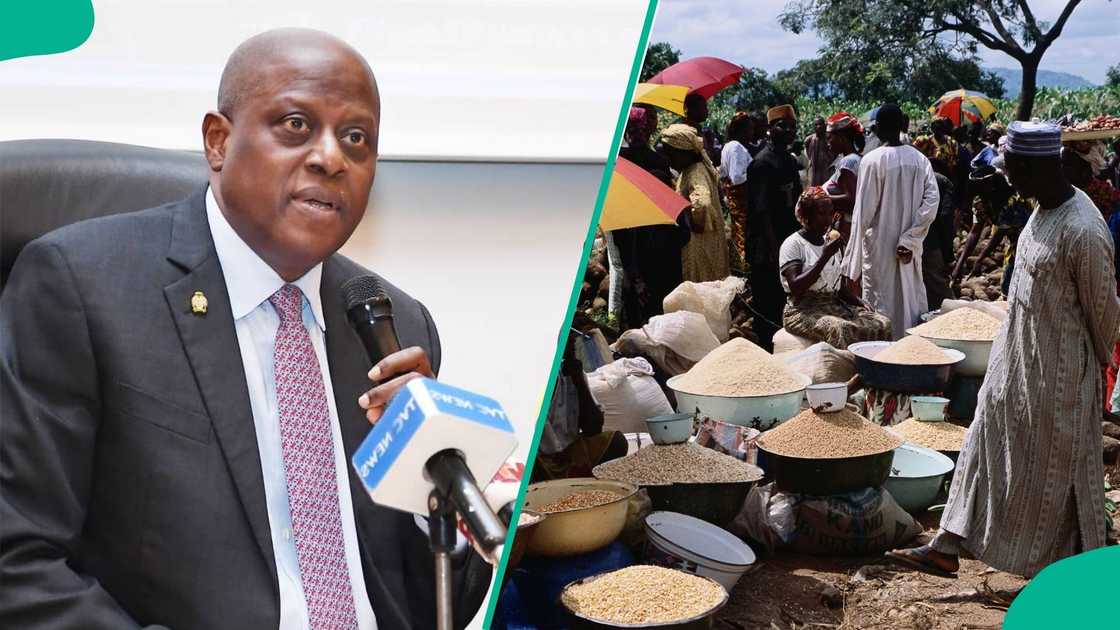World Bank Predicts CBN Policies Will Lower Average Inflation in 2025
- Nigeria's inflation rates kept going higher and higher every month in 2024, despite the CBN's fiscal measures to control it
- The rise started again in 2025, even after the rebasing of the CPI and inflation figures in January
- However, the World Bank expects that the CBN's tactics will eventually work, and inflation will decline in 2025
Legit.ng journalist Ruth Okwumbu-Imafidon has over a decade of experience in business reporting across digital and mainstream media.
Nigeria's headline inflation has been a source of worry for many since 2024, especially when all of the Central Bank of Nigeria's fiscal tightening measures did not yield the desired results.
Since the rebasing of the Consumer Price Index (CPI) in January 2025, headline and food inflation have been on the increase again.
Data from the National Bureau of Statistics (NBS) showed that inflation has increased again to 24.23%, up from 23.18% in February 2025.

Source: Getty Images
Despite this, the World Bank projects that the CBN strategy will eventually yield the desired results, and average inflation will decline to 22.1% in 2025.
World Bank projects lower inflation in Nigeria
The World Bank forecasts that Nigeria’s inflation rate will drop to 22.1% in 2025, thanks to the Central Bank of Nigeria’s fiscal tightening measures aimed at restoring price stability.
The prediction was contained in a statement published on the World Bank website on Monday, after the launch of the Nigeria Development Update report in Abuja.
The biannual report, titled “Building Momentum for Inclusive Growth,” contained, among other things, a list of priorities the government can adopt to sustain reforms and promote inclusive growth.
The Nigeria Development Update is one of the World Bank’s flagship economic publications on Nigeria and provides regular analysis of trends, reforms, and risks in Africa’s largest economy.
The bank noted in the report that headline inflation in Nigeria has remained concerning despite the improvement in revenue mobilisation, fiscal consolidation, and GDP growth.
It stated that with CBN sustaining its tight stance on monetary policies, the pressures will reduce and average inflation will decline in 2025.
World Bank identifies inflation drivers
The report highlights several factors that have driven inflation upward in recent years, including the removal of fuel subsidies and FX deregulation.
Others include unification of the exchange rate, food supply chain disruptions, rising energy costs, and rising logistics costs.
It also commended the positives, like the growth in government revenues from N16.8 trillion in 2023 to N31.9 trillion in 2024; the narrowing of the fiscal deficit from 5.4% of GDP in 2023 to 3% in 2024.
World Bank advises FG on key sectors
The World Bank commended the progress made and urged the government to restructure public spending to make impactful investments in Nigeria’s social infrastructure.
Taimur Samad, the acting World Bank Country Director for Nigeria, emphasised that the government has a unique opportunity to invest in human capital, social protection, and infrastructure to drive sustainable growth.

Source: Getty Images
He advised the government to inject investments into sectors that create jobs at a large scale, pointing out that even though Finance and ICT are among the top performers in the Nigerian economy, they are not labour-intensive and cannot create enough jobs.
World Bank Lead Economist for Nigeria, Alex Sienaert, recommended that the public sector cannot generate enough jobs to grow the economy, and so should be positioned as a provider of essential services and enabler for private sector investments.
CBN explains how it will lower inflation
In related news, the Central Bank of Nigeria has spoken on the strategies it will use to bring inflation rates down from double-digit to single-digit.
Legit.ng reported that the recently rebased CPI report saw headline inflation drop from 34.8% in December 2024 to 24.48% in January 2025, and the apex bank decided to relax its stance afterwards.

Read also
Nigeria set to access more infrastructure financing, joins Asian Infrastructure Investment Bank
CBN Governor Olayemi Cardoso stated that the bank will continue with orthodox monetary policies to bring inflation rates down to single digits.
Proofreading by James Ojo, copy editor at Legit.ng.
Source: Legit.ng





